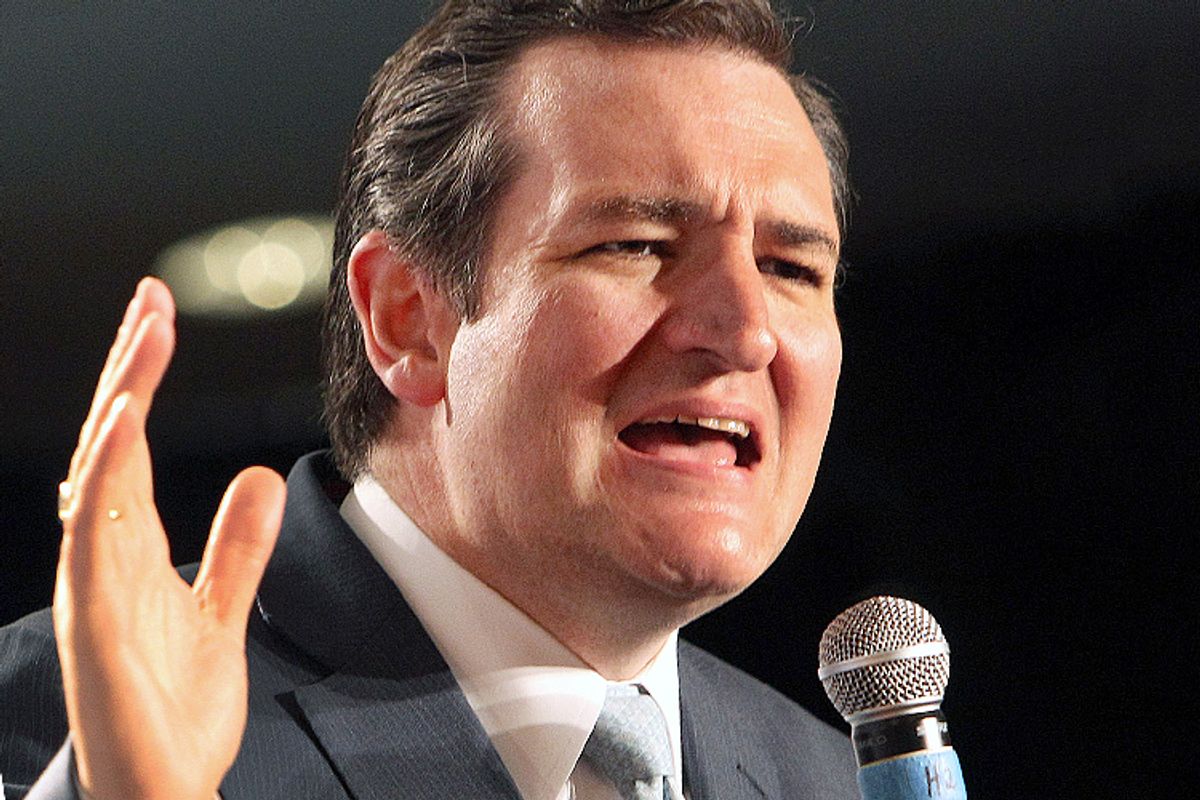What has our old pal Sen. Ted Cruz been up to lately? He hasn't been getting the outrageously disproportionate share of news coverage that the junior senator from Texas had grown accustomed to. That's because he's been hard at work, crouched over his desk, crafting legislation of the utmost importance to the future of the Republic: He's going to eliminate super PACs once and for all.
Why do we say that? Because he's named his new piece of campaign finance legislation the "SuperPAC Elimination Act of 2014." Who are we to second-guess the intentions of a bill with such a title.
The thing about this bill, though: It wouldn't eliminate super PACs by, say, rewriting campaign finance law to restrict the flow of money to and from independent-expenditure committees. It wouldn't reverse the Citizens United court decision that gave way to their rise. (Neither would the Democrats' proposed constitutional amendment that purports to do just that, as we've reported.) No, those approaches -- trying to eliminate something by taking direct steps to eliminate it -- would be a little too straightforward, a little too... predictable?... simple?... for a brain the magnitude of Ted Cruz's to conjure. And so his proposal to eliminate super PACs, the iteration of all that is bad with "money in politics," would be to... eliminate all campaign donation limits? Okay, sure, why not. According to The Hill, "Cruz’s SuperPAC Elimination Act of 2014 would eliminate the caps on direct contributions to candidates from individuals and would also require all donations over $200 to be disclosed within 24 hours."
The theory behind "SuperPAC Elimination" here is that if candidates and parties were able to directly receive unlimited contributions, megadonors would be able to run their cash straight through direct channels rather than circumvent them through a third-party super PAC. This is in line with the Roberts Court's irritating line of logic that since Citizens United (which was great!) gave rise to all of these uncontrollable outside players, we need a McCutcheon to help bring campaigns and parties back into a competitive position. Cruz's bill tries to bring about the presumed Next Big Step in the unraveling of campaign finance restrictions -- eliminating campaign donation limits -- statutorily, rather than waiting for the Supreme Court to get around to it.
All of this thinking, however, treats our current money-in-politics predicament like a zero-sum game rather than the ever-expanding farce that it is. Who's to say that once megadonors are allowed to give unlimited amounts to campaigns that they'd stop giving to super PACs as well? What if they give comically large amounts to both? To billionaires, our politics can be bought relatively on the cheap. Why not add a little bit more to the tab? There are pros to both inside and outside donations, each appealing to donors' enormous egos. Donations to campaigns and parties brings about access to candidates. Donations to outside groups, like super PACs, gets the middle-managing, know-it-all campaign strategists out of the way and allows the big donor to say whatever he wants to say. Why not have both?
If Cruz did choose the "SuperPAC Elimination" title because he's serious about reversing donor shifts toward outside groups -- and all indications are, at this point, that he's mostly trying to tweak Democrats -- then he's behind the times. The truth is that super PACs are yesterday's news in the big-money world. It's nice that they allow for unlimited donations, but they also require the disclosure of donors. Cruz's bill would offer campaigns the same treatment. And it's that "disclosure" thing that's scaring donors away from super PACs and into 501(c)(4) nonprofits (so-called "dark money" groups) as their unlimited-donation vehicle of choice. The Washington Post recently did an excellent piece on this trend:
Several prominent pro-Republican advocacy groups say they are benefiting from a burst of cash as some donors — fearful of harsh public attacks such as those aimed at the Kochs — turn away from political committees that are required by federal law to reveal their contributors.
The trend can be seen at the prominent GOP super PAC co-founded by strategist Karl Rove, American Crossroads, which discloses its donors to the Federal Election Commission.
The group, which hauled in $117 million during the 2012 election, has raised $9 million so far this cycle, including just $266,000 in April.
At the same time, group officials said, donors are more interested than ever in supporting Crossroads GPS, a sister organization with a tax-exempt status that allows it to keep its donor list private. The two groups recently kicked off a $10 million television advertising campaign against vulnerable Senate Democrats — $8 million of which was paid for by Crossroads GPS.
So what would the effects of Cruz's "SuperPAC Elimination Act" be? Much more money flowing directly to campaigns, with a gusher of outside money still flowing through super PACs and, now more than ever, "dark money" nonprofits.
To stop the flow of outside money and bring donors out of the darkness, Cruz should throw his support behind a proposed IRS rule to curtail the political activity of 501(c)(4)s. But that would probably violate various deeply held principles of his about viewing the IRS as a legitimate entity, or something.

Shares